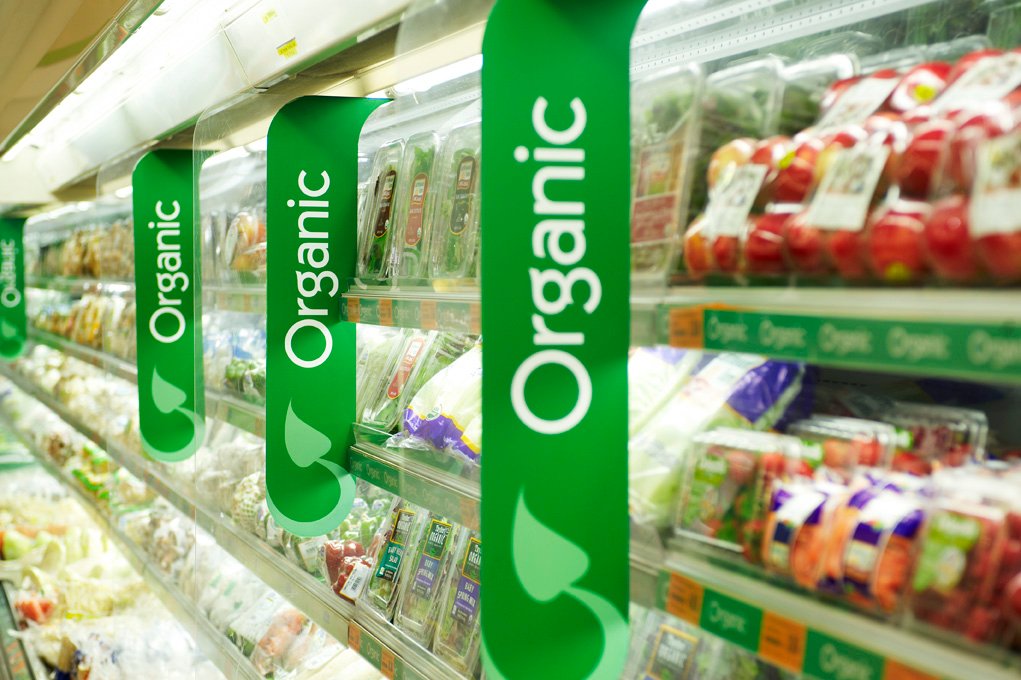
Organic food sales have skyrocketed throughout the US over the last few years, with an estimated $43.3 billion in total organic sales for 2015. Many people have been turning to the organic market because they believe that it is superior to the non-organic market. And one of the reasons that they believe this to be true is because they think that organic means no-pesticides were used for the growing of the crop, but it turns out that this isn't always the case.
Every year the USDA gathers roughly 10,000 samples of fruits and vegetables from both the organic and non-organic market. This yearly analysis is known as the USDA Pesticide Data Program (PDP) and back in 2015 it found evidence of pesticide use on a number of organic samples.
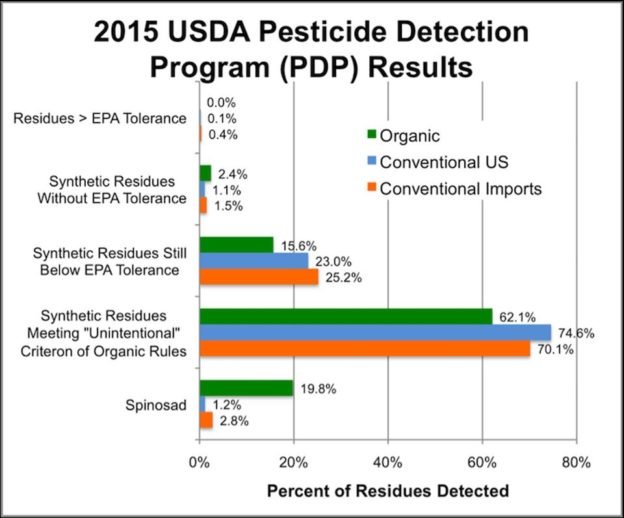
For their 2015 study, they found residues of about 68 different pesticides, as well as pesticide metabolites, and plant growth regulators, on their samples of organic fruits and vegetables.
For some of the samples, the chemical residue was even found to be higher than on the conventional non-organic samples.
These results go to show that despite a product being labeled as 'organic' it can still be grown with the use of pesticides. Organic farmers are restricted to using a limited variety of pesticides which are known to be "naturally-derived". According to the National Center for Food and Agricultural Policy, the two most popularly used fungicides for organic growing, are copper and sulfur.
It's believed by many that naturally-derived organic pesticides are going to be healthier for us than synthetic options, but research into this area suggests that there is still cause to worry with consumption of organic pesticides. And it's alleged that they can promote a variety of potential health issues. Imagine what potential health issues the synthetic ones might foster.
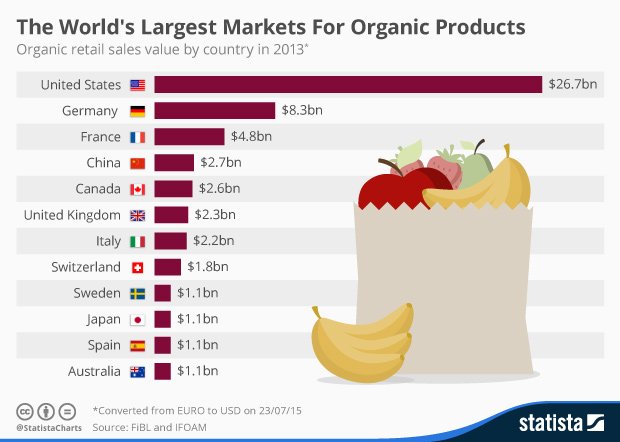
Demand for organic food isn't just growing in the US either, it's growing in many places around the globe. As is the trend toward self-sufficiency and a newfound popularity for gardening and farming. Especially thanks to a number of technology developments today, like that associated with hydroponics and aquaponics etc, it is helping to make growing more efficient and fun for many.
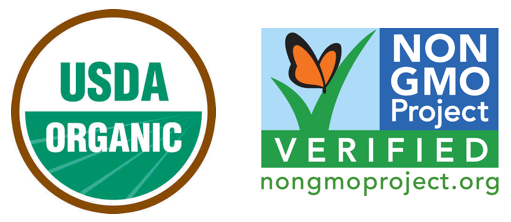
Just a decade or so ago, you would never even see the USDA organic or voluntary non-gmo label on any food items in the store. But now, depending on where you go, you likely see the designation on a wide variety of items in the market. That's because more consumers are increasingly demanding these items, and so now we are even seeing places like Walmart, Target, Fred Meyer, and others, provide a variety of organic options to their customers. Even more pet owners are increasingly turning to organic food for their pets.
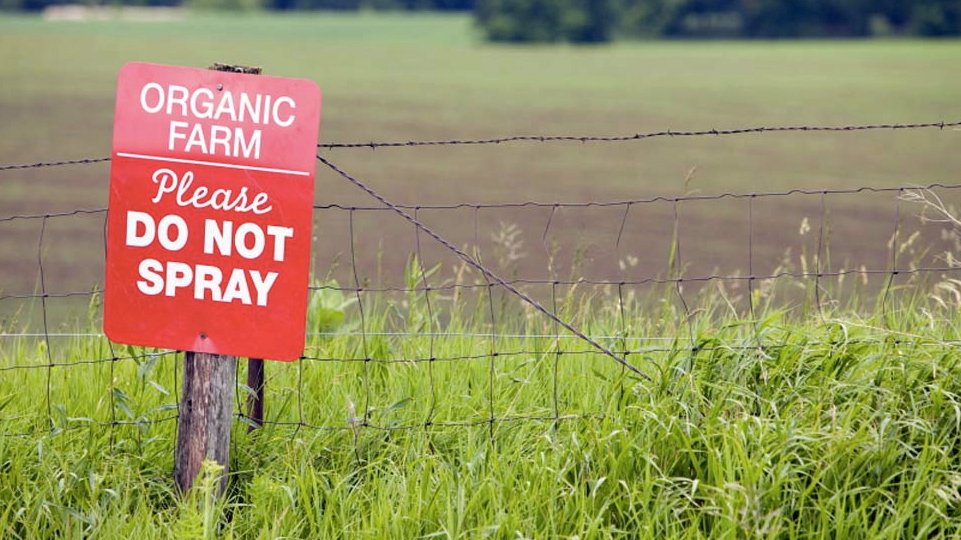
Despite the risk of picking up an organic food item that is laced with unwanted fungicides or pesticides etc, consumers still seem more than willing to pay much higher prices for organic items than the non-organic competitors. Some might wonder why any consumer would be willing to pay more for basic food items, when there are studies suggesting that you might not receive any more nutritional value from that food item than you would a non-organic item that has been grown with synthetic pesticides etc.
But not all organic crops are grown the same or provide the same value.
Aside from organic farmers who do use organic pesticides and fungicides, there are also a number of farmers out there today who don't use any chemicals or poisons on their food; it's all natural from start to finish. And those growers are hard to find.
Regardless of the anti-organic advocates, the market demand for organics is still growing strong and organic advocates remain adamant that organic foods are the superior option. Studies find that self-reported purchases of organic food, have been strongly associated with the belief that the product is going to provide some superior health benefit.

Pics:
Go Organic CA
Genetic Literacy Project
Statista
3dponics
The information that is posted above is not intended or implied to ever be used as any substitute for professional medical advice, or diagnosis or treatment. The above is posted for informational purposes only.
Source:
https://www.geneticliteracyproject.org/2017/03/10/buying-organic-food-to-avoid-pesticides-you-may-want-to-reconsider/
https://www.ota.com/news/press-releases/19031
https://www.statista.com/chart/3681/organic-retail-sales-value-by-country/
https://www.forbes.com/sites/stevensavage/2017/03/06/organic-might-not-mean-what-you-think-it-means/#4d9c824e3c3b
https://blogs.scientificamerican.com/science-sushi/httpblogsscientificamericancomscience-sushi20110718mythbusting-101-organic-farming-conventional-agriculture/
https://www.ncbi.nlm.nih.gov/pubmed/12781160
http://www.health.harvard.edu/blog/organic-food-no-more-nutritious-than-conventionally-grown-food-201209055264
http://www.petfoodindustry.com/articles/6130-organic-pet-food-market-positioned-for-growth?v=preview
Related Posts:
Hydroponics: New Life To An Old Way Of Growing
@doitvoluntarily/hydroponics-new-life-to-an-old-way-of-growing
Food Investigation: DNA Testing Of Popular Fast Food Chicken Products
@doitvoluntarily/food-investigation-dna-testing-of-popular-fast-food-chicken-products
